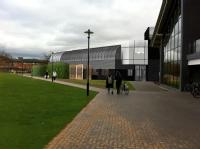University of Warwick serves up £5m boost for global food security research

 The University of Warwick is investing £5 million in a hi-tech research centre which will further enhance its world-class expertise in the science behind global food security.
The University of Warwick is investing £5 million in a hi-tech research centre which will further enhance its world-class expertise in the science behind global food security.
As part of a new strategy to develop its plant and crop research, the University’s School of Life Sciences has unveiled plans to build state-of-the-art glasshouses and controlled environment facilities at its Coventry campus.
The two-storey 1,200 sq m Phytobiology Facility, to be completed in 2013, will be used for research looking at vital areas such as resistance to pests and diseases, how plants cope with environmental stress and the mechanisms behind plant reproduction.
The new facility will use modern energy-saving technologies to ensure that the glasshouses are as energy-efficient as possible.
The University of Warwick was also recently named a strategic partner of funding body BBSRC, which means a significantly increased level of dialogue about research planning between the two organisations.
University of Warwick Vice-Chancellor Professor Nigel Thrift said: “Food security is a research priority for the University of Warwick as the world faces up to the challenge of feeding its growing population against a backdrop of diminishing resources and uncertainty around climate change.
“As a University we intend to rise to our part of that challenge and this £5 million investment sends a clear signal of how serious we are about this.”
Located on central campus, the multi-million pound investment forms part of a new integrated vision for plant and crop science at the School of Life Sciences’ two sites at Gibbet Hill and Wellesbourne.
University of Warwick Head of the School of Life Sciences Professor John McCarthy said: “Warwick is already playing a leading role in research into the crops and plants that will enable us to put food on the table for future generations.
“This new £5 million investment will allow a more integrated approach within the University by better supporting a research community of more than 80 scientists all working to improve the security of the global food chain. We have recently also made two new key academic appointments in plant science that will strengthen our overall position as a major player in this area.
“As well as a state-of-the art glasshouse on the upper floor, the new building will feature walk-in growth rooms and cabinets, seed preparation and storage facilities and laboratories for the molecular analysis of plants.
“This kind of technology is vital to build our understanding of the factors affecting food security on a global scale and will help ensure the world has secure access to food in the coming decades.”
The Wellesbourne site will remain home to the Warwick Crop Centre, which will focus on the crop development work that depends on the excellent field-trials infrastructure, glasshouses and skilled technicians available at that site.
Warwick Crop Centre is also home to the Genetic Resource Unit, a leading international resource of genetic diversity for horticulture crops.
The new vision will also enable Warwick Crop Centre to develop a more distinctive and industry-focused research and development profile, complementing the fundamental research activities on Warwick main campus.
This redistribution of research activities between the two campuses will strengthen Warwick’s ability to generate exciting research and to act effectively as partners in research and training for the wider community.
There will be a two-way dialogue between industry and researchers based at Wellesbourne and main campus.
Plant science applications arising from the new facilities on main campus will also support work at Wellesbourne by feeding through into the applied research activities at Warwick Crop Centre.
The crop centre will also maintain its own standalone strategic research in areas such as biological control of plant pathogens, genetic diversity in vegetable crop species and interaction between agriculture and the environment.
ENDS
Notes to editors
For further information please contact Peter Dunn on p.j.dunn@warwick.ac.uk
02476 523708 or 07767 655860
The University of Warwick School of Life Sciences, incorporating the Warwick Crop Centre, is a centre of excellence for research into plant science and its application to sustainable agriculture, horticulture, food security and healthy nutrition.
The School of Life Sciences, based at the University’s Gibbet Hill Campus, is a major contributor to international plant science research.
It hosts over 20 research groups, covering a uniquely comprehensive range of research stretching from underpinning fundamental bioscience through to applied crop science and horticulture.
The School has leading international groups in plant and crop genetics, disease and stress resistance, plant reproduction, plant circadian clocks, seed biology, plant-environment interactions, nutrient usage, rhizosphere biology, post-harvest quality, weed science, pest and pathogen biology and crop evolution
